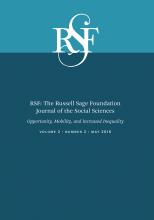Abstract
This paper considers whether expanding access to center-based early childhood education (ECE) will reduce economic inequality later in life. A strong evidence base indicates that ECE is effective at improving young children's academic skills and human capital development. We review evidence that children from low-income families have lower rates of preschool enrollment than their more affluent peers. Our analysis indicates that increasing enrollments for preschoolers in the year before school entry is likely to be a worthy investment that will yield economic payoffs in the form of increased adult earnings. The benefits of even a moderately effective ECE program are likely to be sufficient to offset the costs of program expansion, and increased enrollment among low-income children may reduce later economic inequality.
- Copyright © 2016 by Russell Sage Foundation. All rights reserved. Printed in the United States of America. No part of this publication may be reproduced, stored in a retrieval system, or transmitted in any form or by any means, electronic, mechanical, photocopying, recording, or otherwise, without the prior written permission of the publisher. Reproduction by the United States Government in whole or in part is permitted for any purpose. Direct correspondence to: Katherine Magnuson at kmagnuson{at}wisc.edu, School of Social Work, University of Wisconsin–Madison, 1350 University Ave., Madison, WI 53711; and Greg J. Duncan at gduncan{at}uci.edu, School of Education, University of California, Irvine, 2001 Education, Irvine, CA 92697.
Open Access Policy: RSF: The Russell Sage Foundation Journal of the Social Sciences is an open access journal. This article is published under a Creative Commons Attribution-NonCommercial-NoDerivs 3.0 Unported License.






